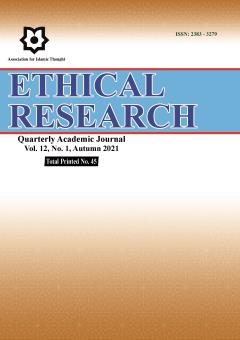-
-
List of Articles
-
Open Access Article
1 - Phenomenology of customers’ hope for banking services in Keshavarzi Bank with an approach involving ethics, innovation and quality management system
asghar ahmadi farshid namamian Ali Asghari Sarem Tohfeh Ghobadi Lamouki -
Open Access Article
2 - Identify criteria and components affecting ethical principles and provide an appropriate model in the electronic banking system
Gholam Reza Amjadi -
Open Access Article
3 - Components and value structure and lifestyle of Iraqi Muslims during the Abbasid period
Ghelareh Amiri -
Open Access Article
4 - The Impact of Deprivation of Rights on Intrinsic Dignity and Human Personality in Civil Rights
Farhad Parvin Hoseinieh Radpasand -
Open Access Article
5 - A Study of Ethical Principles in Judicial Oversight in Iranian and British Law
Hashem Pouran Fard Seyed Mohammad Mahdi Ghamami Vali Rostami -
Open Access Article
6 - Jurisprudential-ethical analysis of "the right to a healthy environment" as a human right
askar jalaliyan -
Open Access Article
7 - comparative study of the effect of religious beliefs on the social well - being of elites and non – elites (Case studies of university faculty members & citizens of Tehran)
Sara Haji Mozafari nayereh pirahari shideh parnian -
Open Access Article
8 - Comparative study and analysis of the perfect man In the thought of Sheikh Mahmoud Shabestari and Abdul Rahman Jami
Samaneh Sotoudeh Kheirabadi Samira Rostami Mohammad Ali Atash Soda -
Open Access Article
9 - Study and analysis of the moral miracle of the Holy Quran
Mahin SHahrivar -
Open Access Article
10 - Providing a model for talent identification and succession in order to establish a competency system (Case study: Bank Mellat companies)
elaheh sheykhi masoud haghighi Alireza Rezghirostami -
Open Access Article
11 - Designing a marketing model to promote and improve the sale of herbal medicines: A qualitative research
Zakieh Ashouri seyyed mahmoud shabgoo monsef kambiz shahroodi ali gholipour Soleimani -
Open Access Article
12 - Optimal marketing behaviors and its impact on the development of Internet TV (Case study: Audience of ordinary TV and Internet TV in Isfahan)
Zahra Askari Esmaeil Hasanpour Mohammad Hossein Ranjbar Serajedin Mohebi -
Open Access Article
13 - Criteria of human ethical decision making of managers in conditions of environmental complexity (Case study, Social Security Organization)
Mahnaz Sarafraz Kakhki Mohammadreza Zabihi Seyed Mahdi Alvani Mahmood Alborzi -
Open Access Article
14 - Ethical practices in entrepreneurship and export learning orientation
Ali Kazemi Alireza Rousta abdollah naami -
Open Access Article
15 - Optimal Value Model of Strategic Alliance of Manufacturing Companies in Iran (Case Study, Methanol Manufacturing Company)
Hojjat Mobarzi Ali Hosseinzadeh Mohammad Ghasemi Namaghi -
Open Access Article
16 - Social health, corruption on earth and war from the perspective of Islamic jurisprudence and law
ali yazdani h0sein ahmari MOSTAFA RAJAEIPOUR
-
The rights to this website are owned by the Raimag Press Management System.
Copyright © 2017-2026







